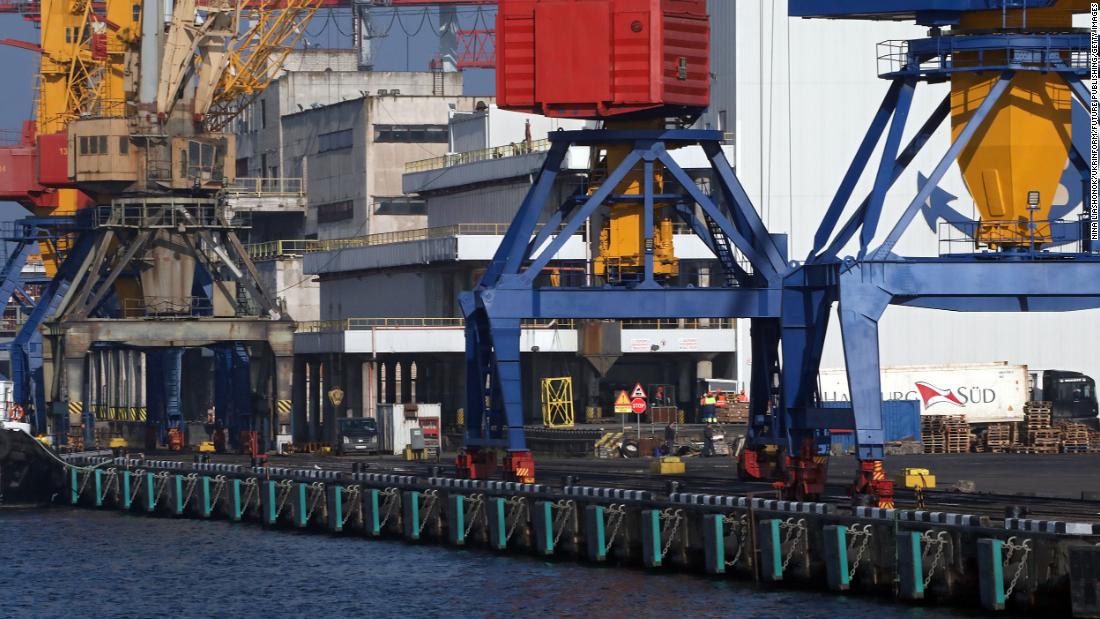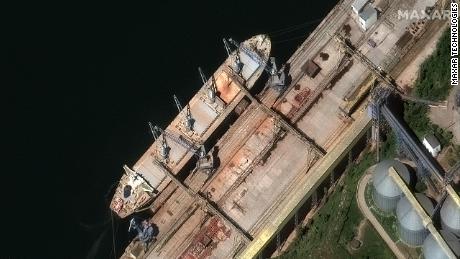
CNN obtained a decision by a court in Kyiv on July 20 that gave authorities permission to hold the ship. The office of the Ukrainian Prosecutor General had asked the court to “prohibit representatives of the registered owner, actual owner, operator, charterer and any other persons from taking measures to dispose of, use, alienate the specified property, including by prohibiting them from leaving the port of Chornomorsk.”
It was not immediately clear when Ukrainian authorities moved to detain the vessels, but shipping industry sources tell CNN it happened in the last week. One shipping source who declined to go on the record because of the sensitivity of the issue, said that Ukrainian authorities had moved to impound the ship because they wanted to seize any Russian asset possible.
A Ukrainian official confirmed to CNN Friday that “the ship is under arrest and not allowed to leave the port.” The official would not be identified as they were not authorized to speak on the record. A second source familiar with operations at the Chornomorsk also confirmed the ship had been detained.
A shipping industry source told CNN that the Emmakris III had been loaded with some 60,000 tonnes of grain already bought by the Egyptian government. The vessel has been stranded in Chornomorsk since the Russian invasion began in February.
In the months that followed the invasion, Ukraine persistently complained that Russian aggression in the Black Sea had paralyzed commercial shipping, with Ukrainian officials specifically mentioning the Emmakris III. The Ukrainian embassy in Cairo said on Facebook in April: “Russia is blocking an Egypt-bound ship loaded with Ukrainian wheat that was purchased by Egypt.”
Russia has said Ukrainian mining of coastal waters is to blame for the halt to shipping.
Now the Ukrainians themselves are preventing the ship from leaving. The prosecution in the Kyiv court case said that while the Emmakris III is ostensibly owned by a company in Dubai, its “actual owner” is a Russian shipping firm based in Rostov-on-Don called Linter.
CNN has reached out to Linter, and to the Russian Defense Ministry. At time of publication, neither had responded.
Linter is also listed by shipping databases as the owner of the Emmakris II, which has allegedly been involved in carrying grain stolen from occupied parts of Ukraine. Linter’s website includes photographs of the Emmakris II in the Black Sea.
A weeks-long investigation by CNN based on satellite imagery, photographs and shipping data, shows that the Emmakris II spent several days moored off the port of Sevastopol in Russian-annexed Crimea at the end of June.
It received several visits from a smaller ship that had loaded grain in the port — and which appears to have transferred its cargo to the Emmakris II.
The smaller vessel, the M Andreev, which is also registered to Linter, had been photographed loading in Sevastopol days before it went alongside the Emmakris II, according to a shipping source in Sevastopol.
The source spoke on condition of anonymity due to safety concerns.
Shipping sources have told CNN that there has been frequent trans-shipment of grain to bulk carriers sitting off Sevastopol going back several months.
The Emmakris II set off from its anchorage on July 6 and was photographed passing through the Bosporus four days later.
The ship tracking service MarineTraffic shows it passing through the Red Sea and into the Gulf of Oman, with its destination given as the Iraqi port of Umm Qasr. But its transponder or tracker was turned off on July 22.
In several instances, as CNN has reported, ports in Egypt and Lebanon have refused to accept the grain after appeals from the Ukrainian government. At least two shipments have ended up in a Syrian port.
Russian authorities in Crimea have acknowledged the trade but insist the grain is bought legally. In June, the head of the Crimean administration, Sergei Aksyonov, said that “grain from the liberated territories is in transit to the Republic of Crimea, then it goes to Sevastopol for sale.”
Last month, Ukrainian authorities estimated at least half-a-million tonnes of Ukrainian grain had been illegally shipped by the Russians.
Nic Robertson, Josh Pennington, Gianluca Mezzofiore and Katie Polglase contributed to this report.
